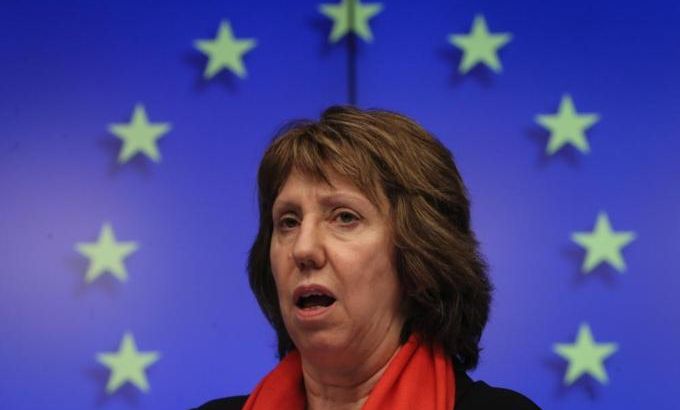EU imposes sanctions on Ukrainian officials
Bloc agrees to put travel ban and asset freeze on officials as dozens of people are killed in the capital Kiev.

The European Union has agreed to impose a travel ban and asset freeze on Ukrainian officials who are deemed responsible for the violence in the country, according to EU foreign ministers and officials.
Thursday’s announcement came hours after at least 70 people were killed in the anti-government protests in Ukraine, a day after the US imposed its own targeted sanctions on various Ukrainian officials.
The EU foreign ministers held an emergency meeting on Thursday in Brussels on the deadly violence going on in Ukraine.
“In light of the deteriorating situation, the EU has decided as a matter of urgency to introduce targeted sanctions including asset freeze and visa ban against those responsible for human rights violations, violence and use of excessive force,” Catherine Ashton, EU foreign affairs and security policy chief, said in a news conference after the meeting, reading the EU statement.
“Member states agreed to suspend [Ukrainian] export licences on equipment which might be used for internal repression.”
Speaking as she left the Brussels gathering, Emma Bonino, the Italian foreign minister, said that the EU sanctions would be imposed very rapidly.
“The decision is to proceed very rapidly, in the next hours, to a visa ban and asset freeze on those who have committed the violence,” she told reporters.
She also said EU member states also agreed to offer medical assistance and visas to the injured and to dissidents.
Bonino said the position had been agreed with the French, German and Polish foreign ministers, who are currently in Kiev negotiating with Ukrainian President Viktor Yanukovych.
The three foreign ministers, who met Yanukovych in Kiev on Thursday, have extended their stay until Friday. They were reporting back to the emergency ministerial EU meeting in Brussels.
An EU diplomat told Reuters news agency that the number of people on the list however “will depend on developments on the ground”.
US warning
Joe Biden, the US vice president, also warned Yanukovych that the US was ready to impose sanctions on officials guilty of ordering troops to fire on protesters.
Biden spoke to the Ukrainian leader by telephone and “made clear that the United States is prepared to sanction those officials responsible for the violence,” the White House said in a statement.
US navy Rear Admiral John Kirby, a Pentagon spokesman, told reporters that Defence Secretary Chuck Hagel had tried to reach the Ukrainian Defence Ministry to discuss the violence, but “they have been unresponsive to our requests”.
Kirby said the lack of responsiveness was unprecedented.
John Kerry, the US secreatry of state, also condemned the violence in a statement, saying he felt “anger and anguish.”
He called on Yanukovych to undertake serious negotiations with opposition leaders immediately.
“The violence must stop,” Kerry said. “We unequivocally condemn the use of force against civilians by security forces, and urge that those forces be withdrawn immediately.
“The people of Ukraine and the international community will hold to account those who are responsible for what has occurred, and the United States has already begun implementing sanctions through travel bans on Ukrainians responsible for the violence.”
At least 70 people were killed during street fighting between protesters and riot police in Kiev on Thursday, while the country’s interior ministry announced that 67 police officers were seized by the protesters.
Ukraine is the object of a geopolitical tug-of-war between Moscow, which sees it as the historical cradle of Russian civilisation, and the West, which says Ukrainians should be free to choose economic rapprochement with the EU.
The protests by EU-supporters in the country have been going on since late November.
Russia, which has been holding back new loan instalment until it sees stability in Kiev, has various times condemned EU and US support of the opposition demands that Yanukovich, elected in 2010, should share power and hold new elections.